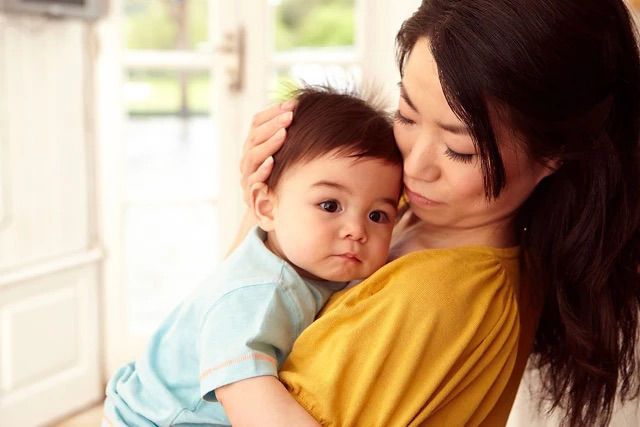Food allergies in babies
Food allergies occur when the immune system mistakenly reacts to certain proteins found in food. The immune system sees these proteins as a threat, causing the body to release histamine, the body’s natural response to all of the classic allergy symptoms. For example, hives, or swelling.
?ts=1701285595274&dpr=off)
The symptoms of a food allergy can be immediate, triggering obvious symptoms, such as a rash, as soon as the food is eaten. They can also be delayed, causing longer-term or recurring symptoms, such as eczema and digestive issues1.
Food allergies are more common in babies than adults, affecting approximately 6–8% of children during early childhood2.
Reassuringly, many children outgrow their allergies as they move later into childhood.
Baby food allergy symptoms to look out for
As you begin your weaning journey and introduce your baby to solids for the first time, it’s important to look out for any reactions that might indicate a food allergy.
The most common, and immediate, signs and symptoms of a food allergy are:
- Swelling of the eyes, lips and throat
- Diarrhoea or vomiting
- Cough
- Wheezing
- Shortness of breath
- A runny nose, red eyes and sneezing
- Itching, hives and eczema
Allergy symptoms can be mild, moderate or severe. Some people experience the same level of symptoms each time they have an allergic reaction, but there’s no guarantee that they won’t be more severe if/when it happens again.
That’s why it’s so important that if your child has a food allergy, it’s properly diagnosed, treated and managed.
Severe wheezing and difficulty breathing can be signs of anaphylaxis which is a severe reaction to an allergy and requires immediate medical assistance. Fortunately, this kind of serious allergic reaction is rare, and for more information you can visit anaphylaxis.org.uk.
How do babies develop food allergies?
Children born into families where allergies already exist are considered to be at a higher risk of developing allergies3. However, just because you have an allergy, it doesn’t necessarily mean your child will, too. Likewise, if there’s no history of allergies in your family, that’s not to say your child won’t develop one.
It’s not uncommon for expectant mums to wonder whether the types of foods they eat during pregnancy can result in their baby developing an allergy. But in reality, if you’re pregnant or breastfeeding, you’re not required to avoid foods that can trigger allergic reactions, unless you're allergic to those foods yourself.
Experts advise that expectant mums eat a healthy, balanced diet and take care to look after their general health.
Common food allergies in babies
Some food are more likely to can cause an allergic reaction than others4. For example:
- Wheat-based foods and other foods containing gluten
- Cow’s milk
- Eggs
- Fish and shellfish
- Peanuts
- Nuts
- Seeds
- Soya
Introducing foods that may cause allergies
It’s best to wait until your baby is around six months old before you introduce them to solid foods5. Once you’re ready to start weaning, it’s likely that you’ll be giving some thought to the types of food your baby can eat.
When it comes to introducing your baby to the foods that are more likely to trigger an allergic reaction, there are things you can do to reduce the risk of your baby developing a food allergy.
Introduce the foods one at a time (one per day) and in very small quantities. If your baby tolerates them, they can then become a part of your baby’s usual diet. If your baby has a reaction, this gradual introduction of foods will help you to identify it3 and narrow down the cause.
Egg allergies in babies
Egg allergy is one of the common allergies, affecting 1 in 50 children in the UK, and it’s caused by the proteins in both egg white and egg yolk6.
NHS guidance states that you can introduce eggs into your baby’s diet from six months7. In fact, evidence suggests that the early introduction of eggs within the first 12 months of life can prevent your baby developing an allergy to them (the evidence also suggests the same for peanuts, allergies to which are discussed below)8.
Most children only have mild reactions to eggs, and symptoms of an allergy usually occur immediately after eating foods containing egg. Symptoms include a rash, swelling of the lips or around the eyes, and itching. Severe reactions are uncommon, but in the event that they occur they’ll need urgent medical attention so always be on the lookout for symptoms worsening6.
To diagnose an egg allergy, your healthcare professional will usually perform an allergy test, for example, a skin prick test, or a blood test. These are commonly carried out if your baby has a history of typical reactions.
Treatment for egg allergy in babies
The best treatment is to avoid all foods containing egg. However, an egg allergy differs from other allergies in that whilst your baby may have a reaction to raw egg, they may be able to tolerate it once it has been cooked into cakes or biscuits, for example.
If baked/cooked egg is tolerated, then these foods should not be taken out of your baby’s diet. That’s because continuing your baby’s exposure to eggs will help them to grow out of their allergy quicker6. Many children will have outgrown their allergy by the time they reach school age9.
Always talk to your GP, health visitor or medical allergy specialist if you notice that your baby is showing symptoms of an allergy after eating eggs, whether that’s raw or cooked. They’ll be able to advise you on the foods your baby needs to avoid, how to interpret food labels and whether or not continuing to introduce cooked egg into your baby’s diet is advisable.
Peanut and other nut allergies in babies
Just like eggs, peanuts and other nuts should be introduced to your baby's diet the moment they start weaning at around six months of age. Waiting until your baby reaches 12 months or older to do so may in fact increase the risk of them developing a peanut or nut allergy11.
For many children, a peanut allergy is lifelong, although research has shown that 1 in every 5 children will outgrow their peanut allergy at some point9,10.
When it comes to allergies, peanuts aren’t the only culprits. Tree nuts such as walnuts, hazelnuts, almonds, cashews and pistachios can act as allergens, causing an allergic reaction in some babies. It’s possible to be allergic to peanuts on their own, or a combination of tree nuts and peanuts.11
Signs and symptoms of a peanut allergy usually occur within minutes of your baby having contact with foods containing them. However, it’s possible for them to appear up to one hour later.
Treatment for peanut and other allergies in babies
It’s very important to seek advice from a healthcare professional if you suspect that your baby has a peanut or other nut allergy. That way, the allergy can be confirmed with a skin prick or blood test.
As there is no current treatment for an allergy to peanuts and/or other nuts, if an allergy is confirmed, it’s important to eliminate all foods containing them from your baby’s diet.
It’s vital that you always read the ingredients list on food items carefully, and remember not to reintroduce peanuts or any other food that might cause an allergy to your baby without medical advice11.
If your baby has already been diagnosed with a food allergy, has eczema or you have a history of allergies in your family, it’s only natural that you might be concerned about your baby developing an allergy to peanuts. As such, you should talk to your GP, health visitor or medical allergy specialist first before introducing your baby to any food containing peanuts.
Dealing with your baby's food allergy day-to-day
For many parents, the diagnosis of their baby’s food allergy can come as quite a relief. But it can also be the beginning of a lifelong journey - one which requires extra thought, care and planning on a daily basis.
Just because a baby or child has a food allergy, this doesn’t mean that they should be perceived as ‘different’ or excluded from any of the normal activities they might do with their friends. Whilst it might feel daunting to eat out, go to parties and functions and travel with your baby if they have a food allergy, there’s really no reason why you shouldn’t do all of these things.
Once you’ve got a good understanding of your child’s allergy, managing it on a daily basis can be relatively easy. Make sure that you provide anybody who cares for them with the information they need about their allergy, and details of the foods they can and can’t eat. And if your child is attending a party or event where food is provided, be sure to inform the host about any allergies your child has.
Always remember that spreading awareness around the issue of allergies is a good thing. Talking to other parents will not only help put your mind at ease, but also help others to understand what the impact of food allergies can be on children.
If you suspect that your baby has any kind of food allergy, call your doctor to discuss this further. They’ll be able to provide a diagnosis and offer support and advice on how to manage the condition.
Depending on the food your child is allergic to, avoiding it may mean that they’re at risk of missing out on key nutrients. It’s a good idea to seek support from a dietitian to ensure that your baby gets the full range of nourishment they need for healthy growth and development12.
related articles
Read more

Need some help?
You can get quick answers to common questions in our FAQs.
Alternatively, if you need help with general pregnancy or baby advice, or maybe on using or ordering our products - our expert team are always on hand to talk about feeding your baby.
- Allergy UK. Food allergy in babies and children [Online]. Available at: www.allergyuk.org/childhood-food-allergy/food-allergy-in-babies-and-children [Accessed April 2021]
- Allergy UK. Childhood Food Allergy [Online]. Available at : https://www.allergyuk.org/information-and-advice/conditions-and-symptoms/42-childhood-food-allergy [Accessed April 2021]
- National Institute for Health and Clinical Excellence (NICE). Clinical Guidance 116 Food allergy in children and young people [online] 2011. Available at https://www.nice.org.uk/guidance/cg116/evidence/full-guideline-136470061. Accessed April 2021
- National Health Service (NHS). Food allergies in babies and young children [Online] 2018. Available at https://www.nhs.uk/conditions/baby/weaning-and-feeding/food-allergies-in-babies-and-young-children/. Accessed April 2021
- National Health Service (NHS). Your baby’s first solid foods [online] 2019. Available at https://www.nhs.uk/conditions/baby/weaning-and-feeding/babys-first-solid-foods/#:~:text=Introducing%20your%20baby%20to%20solid,to%20the%20idea%20of%20eating. Accessed April 2021.
- NHS: North West Paediatric Allergy Network. Egg allergy [Online] 2021. Available at https://allergynorthwest.nhs.uk/resources/allergy-leaflets/egg-allergy/. Accessed April 2021
- National Health Service (NHS). Food allergies in babies and young children [Online] 2018. Available at https://www.nhs.uk/conditions/baby/weaning-and-feeding/food-allergies-in-babies-and-young-children/. Accessed April 2021
- Fleischer DM, Chan ES, Venter C, Spergel JM, Abrams EM, Stukus D, Groetch M, Shaker M, Greenhawt M. A Consensus Approach to the Primary Prevention of Food Allergy Through Nutrition: Guidance from the American Academy of Allergy, Asthma, and Immunology; American College of Allergy, Asthma, and Immunology; and the Canadian Society for Allergy and Clinical Immunology. J Allergy Clin Immunol Pract. 2021 Jan;9(1):22-43.e4. doi: 10.1016/j.jaip.2020.11.002. Epub 2020 Nov 26. PMID: 33250376.
- American College of Allergy, Asthma and Immunology (ACAAI). Peanut Allergy [online] 2019. Available at https://acaai.org/allergies/types/food-allergies/types-food-allergy/peanut-allergy. Accessed April 2021.
- Allergy UK. Peanut allergy [online] 2021. Available at https://www.allergyuk.org/information-and-advice/conditions-and-symptoms/778-peanut-allergy. Accessed April 2021.
- Royal United Hospitals Bath NHS Foundation Trust. Allergy Clinic Pre-appointment advise for children & young people: Peanut and Tree Nut [online] 2015. Available at https://www.ruh.nhs.uk/patients/patient_information/PAE056_Allergy_Clinic_Pre_appointment%20advice_PeanutandTreeNut.pdf. Accessed April 2021.
- Allergy UK. Food allergy in babies and children [Online]. Available at:https://www.allergyuk.org/childhood-food-allergy/food-allergy-in-babies-and-children [Accessed April 2021]
Last reviewed: 09th June 2021
Reviewed by Oriana Hernandez Carrion


?ts=1701283138484&dpr=off)

